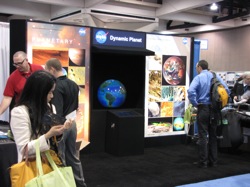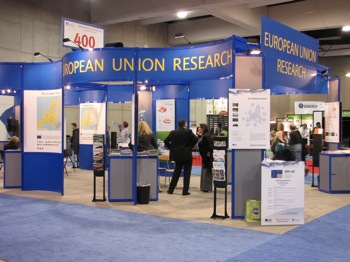
SAN DIEGO –The annual meeting of the American Association for the Advancement of Science (AAAS) draws “thousands” of scientists in virtually every endeavor, from astrophysics to zoology. In climate science circles there was no lack of topics to choose from this year. Among them:
Geo-Engineering
Several sessions were devoted to the notion of fending off climate change by tinkering with earth systems. In technical sessions and news briefings, there was a range of opinion on display, from “Let’s try it” to “Let’s look at it,” to “Don’t even think about it.” There seems to be general agreement that techniques like seeding the atmosphere with particulates could yield rapid results–but the idea is fraught with political controversy and legal pitfalls. Stanford’s Ken Caldeira likened the idea to a cancer patient who accepts the risks of chemotherapy, in order to avoid worse consequences. Philosophy professor (and Caldeira’s former teacher) Martin Bunzl, firmly rejected that analogy, saying that unlike cancer therapy, the risks are not well known and “You can’t just turn it off.” Bunzl directs the Climate and Social Policy Initiative at Rutgers University.
At Climate Watch, we’re preparing an explanatory radio feature on geo-engineering, for broadcast in the coming weeks.
Oceans
The plight of the planet’s oceans was a focus of the conference, with numerous discussions of acidification, marine reserves and the newly implemented concept of “marine spatial planning,” an effort to map the oceans’ topography, biota and habitat, then translate that into a kind of zoning plan for human use (an approach specifically mandated by the Obama administration last year).
In October, researchers will formally conclude the Census of Marine Life, a 10-year collaboration among scientists in 80 countries, to “assess and explain the diversity, distribution and abundance of life in the ocean.” During a media briefing at AAAS, census Co-Chief Scientist Ron O’Dor estimated that the final tally would include 5,000 newly discovered species (“not counting the microbials”), from flying sea cucumbers to the “Rasta sponge,” which, according to O’Dor’s colleague, Shirley Pomponi, appears to sport dreadlocks and also “produces an anti-cancer compound.” O’Dor said one general conclusion from the census would be that while it is “large and resilient, we can’t keep insulting the ocean forever.”
Science & Policy
In keeping with the meeting’s theme of “Bridging Science and Society,” and reflecting the current angst over credibility in science, there were overflow sessions with titles such as “A Wobbly Three-Legged Stool: Science, Politics and the Public.” While people spilled out the door of that room, hard-science lectures in adjacent rooms drew just a smattering of people. In an interview with Climate Watch, Brad Allenby, a professor of engineering and ethics at Arizona State University, lamented that “the climate change discussion has become so polarized, even among scientists, that it’s difficult to present the public with factual information that is credible.”

National Climate Service
NOAA chief Jane Lubchenko used the occasion of the conference to talk up her agency’s new National Climate Service, funded by legislation last year. The new branch will provide one-stop shopping for climate research and tools for policymakers, including those at the state and local level. Lubchenko says she hopes to have the new unit operational by October, when the federal fiscal year turns over.
4 thoughts on “Hot Topics in San Diego”
Comments are closed.

Where is this acidification of the oceans quantified? I’ve seen 30 year records of the ph balance of sea water, which is fed directly from an upwelling area, which must by definition mean a high relative proportion of co2, monitored constantly at the Monterey Aquarium, hasn’t changed at all.
NOAA chief Lubchenko was recently asked point blank if she agreed or disagreed that there has no statisticly significant warming since 1995, she dodged the question both times. Interestingly the launch of the climate service’s website was posponed by blizzard, and when it finally went live they feature the 2007 Arctic ice minimum without reference to the 2008-10 recovery, or mentioning the fact as documented by JPL satellite that the unusual melt of 07 was caused by wind driven ice flows being pushed to warm latitudes, rather then any change in Arctic temps.
Many proponents of global warming clain the oceans are acidding up, but how do they know this?
Where did they actually measure the ocean acidity to verify this claim?
I know of one place that due to the nature of the displays presented has to monitor the oceans ph balance on a daily basis. That’s the Monterey Aquarium.
So ask them for a chart of the ph balance from opening day in 1984 to the present. Don’t just take the AAAS flacks word for it.
You as the scientific reporter must view these events as you would a political convention – because that’s what they are.
MBA press contact page
Re: Craig Miller says:
February 22, 2010 at 8:25 am
I don’t see a problem with the operation. You’ve been doing it for two years. Nothing broken so far.
A suggestion to further the debate. How about including some climate realist blog links on your sidebar. I mean treehugger to greentech? That covers the gamut from “we’re all gonna die in a firey hell” to “those climate skeptics are a bunch of poopie heads”.
Have you never heard of Tom Nelson? How about Roger Peilke? Tim Ball?
Catering exclusively to the industry blogs doesn’t go very far to developing a collegial and respectful spirit of debate.